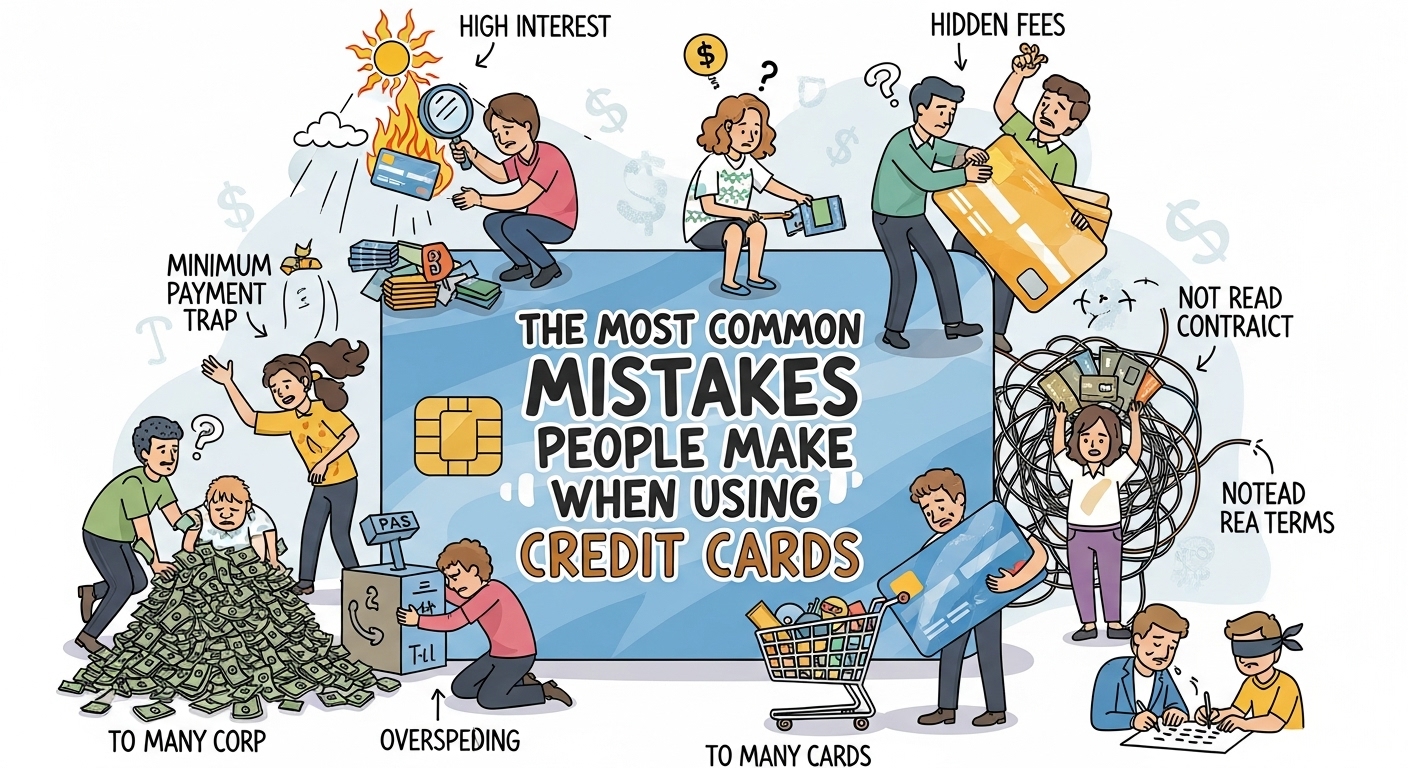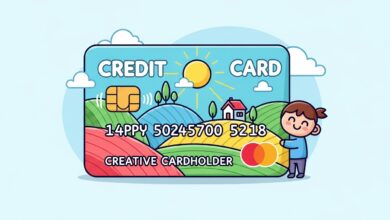The Most Common Mistakes People Make When Using Credit Cards

Credit cards can be incredibly convenient tools for managing daily expenses, earning rewards, and building credit. However, when used carelessly, they can also become a major source of debt and financial stress.
Many people fall into the same traps — paying unnecessary fees, missing payments, or misunderstanding how credit works. In this article, we’ll explore the most common credit card mistakes and how to avoid them to maintain healthy finances and a strong credit profile.
1. Carrying a Balance and Paying Only the Minimum
One of the biggest mistakes credit card users make is carrying a balance month after month and paying only the minimum payment.
While paying the minimum might seem convenient, it can be a financial trap. Why?
- High interest rates: Most credit cards charge 15–25% APR, which means your debt can grow quickly.
- Slow repayment: Paying only the minimum can take years to clear even small debts.
- Wasted money: You’ll end up paying far more in interest than the original purchase amount.
✅ Solution: Always try to pay your full balance each month. If that’s not possible, pay as much as you can above the minimum to reduce interest costs.
2. Missing or Making Late Payments
Late payments not only lead to hefty late fees, but they can also damage your credit score significantly. Even one missed payment can stay on your credit report for up to seven years.
✅ Solution:
- Set automatic payments or reminders on your phone.
- Always pay at least the minimum due before the deadline.
- If you accidentally miss a payment, contact your bank immediately — some may waive the late fee as a courtesy for first-time offenders.
3. Maxing Out the Credit Limit
Using too much of your available credit — known as high credit utilization — can hurt your credit score. Experts recommend keeping your credit utilization below 30% of your total limit.
Example:
If your card limit is $5,000, try to keep your balance under $1,500.
✅ Solution:
- Spread your spending across multiple cards if necessary.
- Make multiple payments throughout the month to keep your balance low.
- Request a credit limit increase (if you qualify) to improve your utilization ratio.
4. Ignoring the Credit Card Statement
Many people don’t review their monthly credit card statements carefully, which is a costly mistake.
Ignoring your statement means you might:
- Miss fraudulent transactions
- Overlook incorrect charges
- Lose track of spending patterns
✅ Solution:
Check your statement every month and report any unauthorized or suspicious transactions immediately. Monitoring your activity helps you stay in control and avoid unpleasant surprises.
5. Overspending for Rewards or Points
Rewards programs can be tempting — cashback, air miles, and discounts sound great. But one of the most common mistakes is spending more than necessary just to earn rewards.
For example, spending $1,000 to earn $10 in cashback doesn’t make financial sense if you don’t pay the balance in full.
✅ Solution:
Use your credit card for planned purchases, not as an excuse to buy more. Remember: Rewards are only beneficial if you don’t pay interest.
6. Applying for Too Many Cards at Once
Each time you apply for a new credit card, a hard inquiry is made on your credit report, which can temporarily lower your score. Opening multiple cards in a short period can also make you appear risky to lenders.
✅ Solution:
Apply for new credit only when necessary. Focus on maintaining one or two well-managed cards rather than juggling several.
7. Closing Old Credit Card Accounts Unnecessarily
Many people close old credit cards to “simplify” their finances, but this can unintentionally hurt their credit score.
Closing an old card shortens your credit history and reduces your overall credit limit, which can increase your utilization rate.
✅ Solution:
If the card has no annual fee, keep it open and use it occasionally to maintain the account’s activity. This helps strengthen your credit profile over time.
8. Ignoring Fees and Hidden Charges
Even with responsible usage, some cardholders lose money due to overlooked fees like:
- Foreign transaction fees
- Cash advance fees
- Balance transfer charges
- Late payment penalties
✅ Solution:
Read your credit card’s terms and conditions carefully. Know what fees apply and how to avoid them. For example, use debit cards for foreign transactions if your credit card charges high foreign fees.
9. Not Understanding Interest-Free Periods
Most credit cards offer a grace period — the time between your purchase and your due date during which no interest is charged. However, if you don’t pay your balance in full, you lose this privilege, and interest will start accruing immediately on new purchases.
✅ Solution:
Always clear your full statement balance each month to enjoy the grace period and avoid unnecessary interest.
10. Using Credit Cards for Cash Withdrawals
Withdrawing cash from your credit card (a cash advance) might seem convenient, but it’s one of the most expensive transactions you can make.
Cash advances typically:
- Come with high fees (often 3–5% of the amount)
- Have no grace period — interest starts accruing immediately
- Affect your credit score if not repaid quickly
✅ Solution:
Avoid cash withdrawals from credit cards. Use a debit card or ATM card for cash instead.
11. Neglecting to Monitor Your Credit Score
Many cardholders don’t check their credit reports regularly, which can hide problems like identity theft or inaccurate data.
✅ Solution:
Check your credit report at least once a year through authorized agencies. Many banks also provide free credit score tracking via their apps or websites.
12. Ignoring the Benefits and Protections of Your Card
Ironically, while some people overuse their cards, others fail to take advantage of valuable benefits such as:
- Purchase protection
- Extended warranty
- Travel insurance
- Fraud protection
✅ Solution:
Familiarize yourself with your card’s features — you might be eligible for perks that save you money or protect your purchases.
Final Thoughts
Credit cards can either be your best financial ally or your biggest source of debt — it all depends on how you use them.
Avoiding these common mistakes can help you:
- Save money on interest and fees
- Build a strong credit score
- Enjoy the benefits of responsible credit use
The key is awareness and discipline. Treat your credit card not as “free money,” but as a tool for convenience, rewards, and credit growth. With the right mindset, you can make credit cards work for you — not against you.
